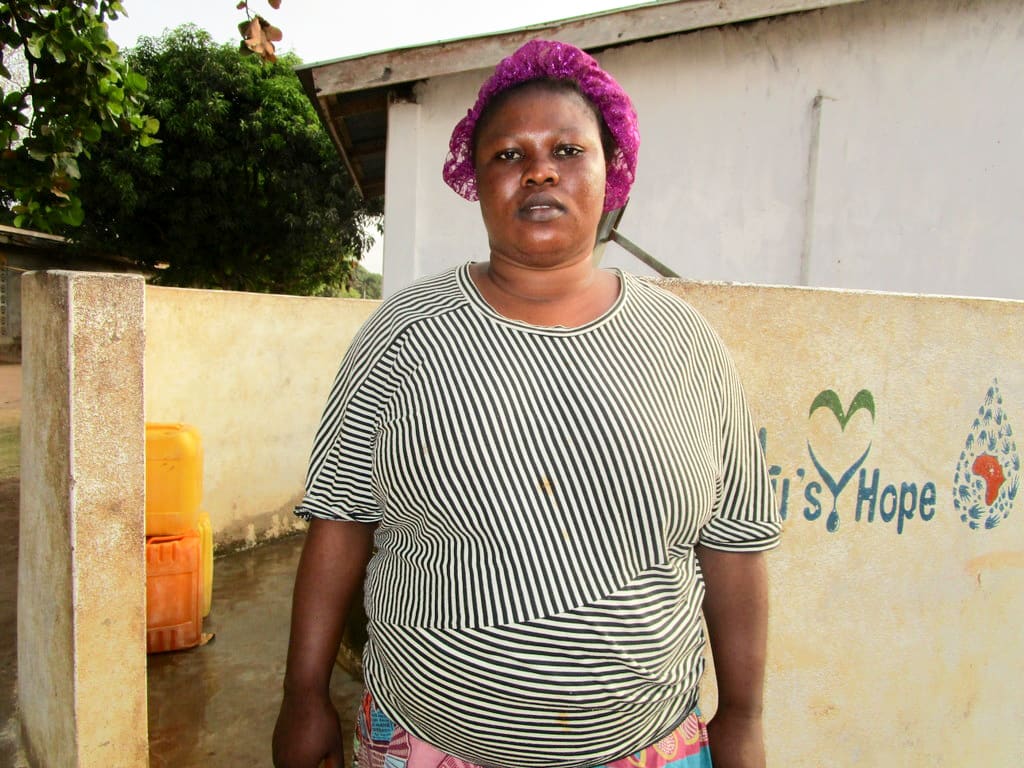This project is a part of our shared program with Mariatu’s Hope of Sierra Leone. Our team is pleased to directly share the below report (edited for clarity, as needed).
Welcome to the Community
Victory Evangelical Church was established in 2008, and is located right in the middle of Rotifunk Community. It used to have a school on its grounds, but it has since ceased operations.
This is a beautiful and rapidly developing community. The Church was built in 2008 with the hopes of uplifting the community. A church in any Sierra Leone village normally accompanies a rise in literacy. Women and children, like in most communities, carry a bulk of the responsibilities around the house. Early in the morning, before they can even brush their teeth, they go out to find water for the day. The rapid development and over-population has increased the need for water here tenfold. If by dawn you are not in line at a well, you might as well forget it for the day. Most community members are either petty traders, teachers, or construction workers.
Water Situation
This hand-dug well is located a few feet from the church's door, so all the noise and quarrels could be heard while worshipers attended service. The church elders were agitated and decided to lock the pump during services, an action that angered the community. The pastor ended up stepping in to show his love for the community and his worshipers, agreeing that the pump should be left unlocked.
The well was installed in 2010 when it began providing safe, clean water to the surrounding community. Over the years, the water levels decreased and transformed this well into an unreliable source. Now through the months of March and July, no water is available when pumping, and opening the well pad revealed there is no water inside.
During these months, the close to 400 locals must look elsewhere for their water. At other water sources, fist fights and late arrivals mark the dry season. If they're lucky, there will be some water at the bottom of another hand-dug well, although time must pass between each use of the pump to allow the water to recharge. Our office gets repeated phone calls from the communities to repair the remaining water pumps that are heavily-relied on during the dry months.
Sanitation Situation
Proper construction of latrines is not a priority in Sierra Leone. A piece of large plastic is wrapped around some sticks with a pit about 20 feet deep. The people who have more money can afford to floor the pit with concrete, but the less fortunate use pieces of timber. Some latrines have no roofs or cover on the pit.
There were only two hand-washing stations observed in the entire community. We met 45-year-old Ramatu Kamara, a petty trader and housewife here in Rotifunk. "The only time we pay attention to our health is when things are really bad. There are more people that self medicate than the ones who seek medical advice from a health professional. God is the only one that looks after us. Our latrines are left open, flies are a part of our daily lives and not to mention cockroaches and rats."
Plans: Sanitation and Hygiene Training
Training will last for three hours a day for three days. The facilitators have already assessed sanitation here and decided that hand-washing and using the latrine will be strongly emphasized. During our hand-washing sessions, community members will be taught how to make their own hand-washing station out of a plastic jerrycan, sticks, and rope. These are the best solution for rural areas, since all the materials are all easily replaceable. Though pit latrines in this community are well-built, we also require that every family have their own.
Training will also result in the formation of a water user committee that will take responsibility for their new well. The members will manage and maintain the pump to the best of their ability, and will call our office if they need a mechanic to make a repair.
Plans: Well Rehabilitation
The well marked for this overhaul needs major work to supply adequate, clean water to the community year round. The pump will be removed, and a man will be lowered inside with a hand auger. This hand auger will allow the team to drill several meters deeper to hit a new water table, which will ensure the well supplies water throughout the drier seasons. As the team drills, casing will be installed, transforming this hand-dug well into a pseudo-borehole. PVC piping will connect this lower system directly to the pump, a construction that we know will also improve the quality of water.
Once this plan is implemented, everyone within the community will have access to safe drinking water in both quality and quantity, even through the dry months.

 Protected Dug Well
Protected Dug Well






















